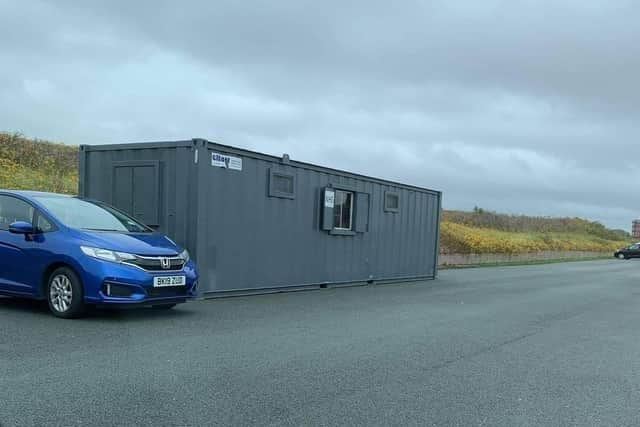NHS Warfarin portable buildings set up on Fleetwood seafront
and live on Freeview channel 276
Local residents were left wondering whether an NHS cabin, which recently appeared on the car park near Marine Hall, was the beginning of a new drive-through Covid-19 testing centre.
But Wyre Council has since confirmed the cabin is a warfarin clinic which provides people with regular blood tests three days a week.
What is Warfarin and what is it used for?
Advertisement
Hide AdAdvertisement
Hide Ad

Warfarin is a type of medicine known as an anticoagulant, or blood thinner, according to the NHS.It makes your blood flow through your veins more easily, meaning your blood will be less likely to make a dangerous blood clot.
Warfarin is used to treat people who have had a previous blood clot, such as:
- a blood clot in the leg (deep vein thrombosis, or DVT)
- a blood clot in the lungs (pulmonary embolism)
It's also used to prevent blood clots if you're at high risk of having them in the future. This includes people with:
- an abnormal heartbeat (atrial fibrillation)
- a replacement or mechanical heart valve
- a blood clotting disorder, such as thrombophilia
- a higher chance of having a blood clot after an operation
The aim of treatment with warfarin is to thin the blood but not stop it clotting completely. Getting this balance right means the dose of warfarin must be carefully monitored.
Advertisement
Hide AdAdvertisement
Hide AdPeople who take warfarin have regular blood tests called the international normalised ratio (INR) which measures how long it takes their blood to clot.
The longer the blood takes to clot, the higher the INR.
Most people taking anticoagulants have a ratio of between 2 and 3.5. This means their blood takes 2 to 3.5 times longer to clot than usual.
The dose of warfarin needed depends on their blood test result. If the blood test result has gone up or down, the warfarin dose will be increased or decreased.